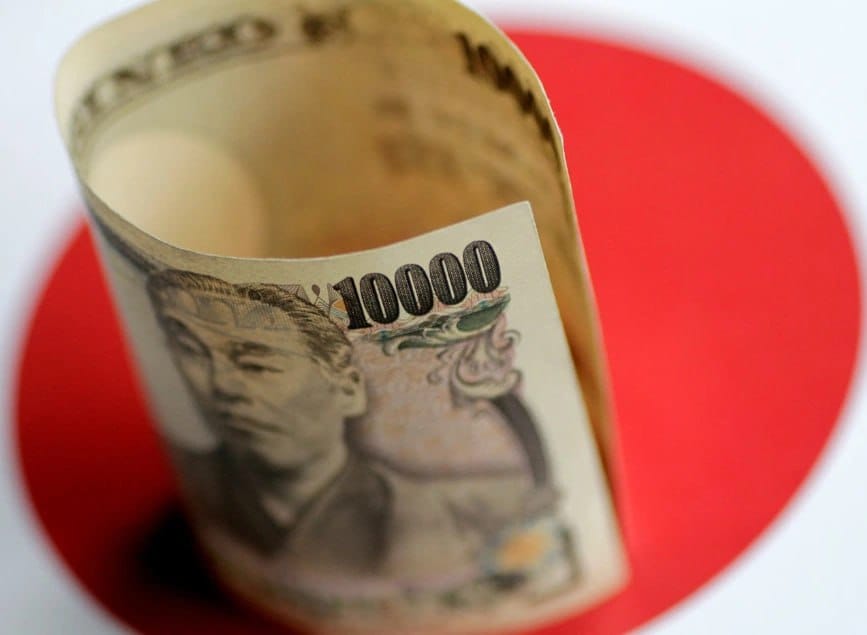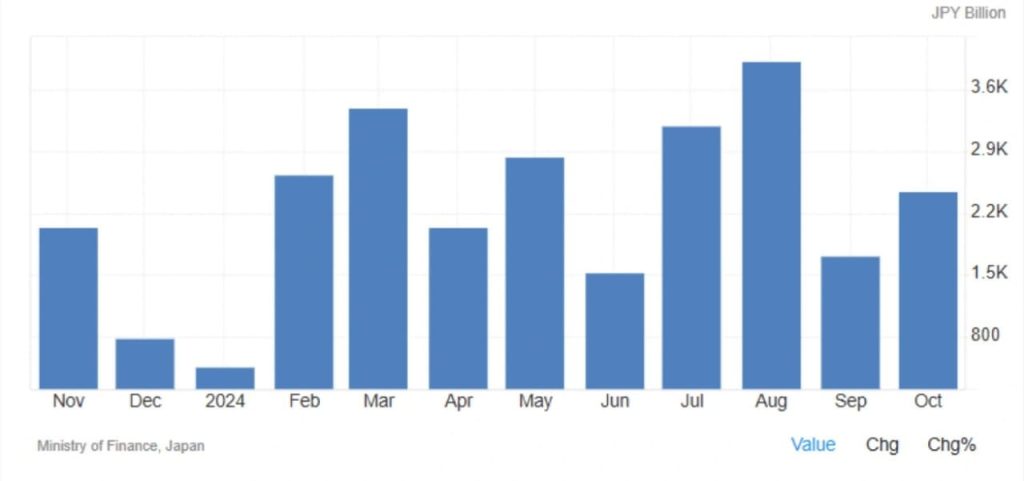
Japan’s Account Surplus Declines in October 2024
In October 2024, Japan’s account surplus saw a decrease to JPY 2,456.9 billion, down from JPY 2,823.9 billion in the same month a year earlier. Despite this decline, the surplus was higher than the market estimates, which had anticipated a gain of JPY 2,318 billion. This marked Japan’s 21st consecutive month of surplus in the current account, highlighting a sustained external financial stability. While the reduction in the surplus may appear concerning at first glance, it is essential to consider the broader economic context, including global trade dynamics and domestic economic policies. The continued surplus reflects Japan’s robust trade relationships and a generally favorable balance of payments, which is crucial for its economic health.

Narrowing Primary Income Surplus
The primary income surplus saw a slight narrowing to JPY 3,254.1 billion from JPY 3,198.1 billion a year earlier. This reduction indicates a modest adjustment in the earnings from investments abroad compared to the previous year. While the primary income account is a significant component of the current account, its smaller surplus suggests sensitivity to global financial conditions. The decrease could be attributed to fluctuations in investment income from abroad, affected by shifting exchange rates and global market volatility. However, the narrowing is relatively minor and does not drastically impact Japan’s overall economic stability. It remains a critical aspect of Japan’s international economic standing, reflecting its diversified investment portfolio.
Widening Secondary Income Deficit and Changing Service Accounts
On the other hand, the secondary income deficit widened to JPY 482.5 billion from JPY 336.2 billion. This increase highlights a growing imbalance in transfers and remittances, which are outpacing receipts from abroad. The widening deficit in secondary income can be partly attributed to Japan’s increasing outflows in personal remittances and other transfer payments. Moreover, the services account shifted to a shortfall of JPY 159.0 billion, from a surplus of JPY 449.4 billion a year ago. This reversal signals the impact of reduced travel and tourism activities due to ongoing global restrictions and economic uncertainties. As travel curbs persist, the services account remains vulnerable to fluctuations in international mobility, which directly affects the balance of payments. These changes underscore the challenges Japan faces in maintaining a balanced current account amidst a turbulent global environment.
Shrinking Goods Account Deficit Amidst Export Growth
Despite the mixed picture presented by the other components, the goods account deficit showed a notable improvement, shrinking to JPY 155.7 billion from JPY 487.4 billion. This substantial reduction can be attributed to a 2.9% increase in exports, coupled with a 0.7% decrease in imports. The growth in exports is particularly significant as it highlights Japan’s strengthened demand for electronics and automotive products in the global market. This boost in exports reflects Japan’s competitive edge in technology and innovation, which continues to drive its trade surplus in the face of global economic challenges. Moreover, the decline in imports indicates a degree of economic contraction domestically, which may be linked to reduced consumption and investment. Nonetheless, the positive adjustment in the goods account deficit is a testament to Japan’s resilience and adaptive economic strategies in a complex global trade environment.
Overall, Japan’s current account surplus remains a vital indicator of its economic health. The mixed performance of its primary income, secondary income, and service accounts reveals the challenges Japan faces in maintaining its trade balance. However, the positive shrinkage in the goods account deficit underscores Japan’s ongoing competitiveness in global trade. As Japan navigates these economic dynamics, its diversified economic structure and proactive trade policies will continue to be crucial in sustaining its external financial stability.
Share
Hot topics

The best indicator for short term trading
When it comes to short-term trading, everything happens quickly. Movement can take place over a matter of minutes; momentum can build and fade quickly; and traders often have to make...
Read more




Submit comment
Your email address will not be published. Required fields are marked *